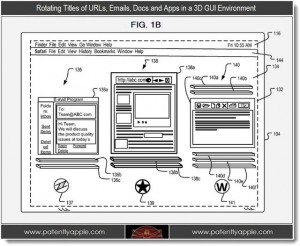 In a few years time, you could be browsing the web in 3D, according to Apple’s new Safari patent applications, which were spotted by Patently Apple on Thursday.
In a few years time, you could be browsing the web in 3D, according to Apple’s new Safari patent applications, which were spotted by Patently Apple on Thursday.
The new patent applications detail a 3D version of Safari, which will allow users to stack bookmarks, emails, documents and applications in a 3D manner.
The patent application describes that the invention relates to: “The presentation and management of Desktop GUIs and opening windows on the desktop GUIs.”
The new technology could enable users to group multiple open windows together, which are then presented in a browsable stack. These stacks could be represented in 3D desktop environment.
“Open windows displayed within a 2D desktop environment can be organised into one or more 3D browsable stacks in a 3D browsable stack, where each stack includes open windows associated with a common value for a grouping property,” reads the patent’s abstract.
It continues: “A graphical representation indicating the respective value of the grouping property associated with each 3D browsable stack can be displayed in proximity to the 3D browsable stack. As the user browses through the open windows in the browsable stack, one window is displayed in a frontal view at a time while the other windows are displayed in a side view. When the user selects an open window from the stack, the 3D desktop can be restored to the 2D desktop, showing the selected window as the current active window of the 2D desktop.”
When Apple talks about the grouping of stacks, it means each 3D stack will represent a different type of application, such as emails, web browser windows or word processing documents.
The browsing items could be represented in a tilted 3D space, according to another of Apple’s new patents.
“In tilted viewing mode, groups of several consecutive levels of hierarchy can be represented in respective browsable parades shown in different depths into a viewable region of the tilted 3D space,” reads Apples’ patent abstract.
“With the combination of browsing laterally across the parades presented in the viewable region of the tilted 3D space and browsing up and down the hierarchy along the depth dimension of the 3D space, the user can navigate the entirety of the hierarchy in the tilted 3D space,” it adds.





